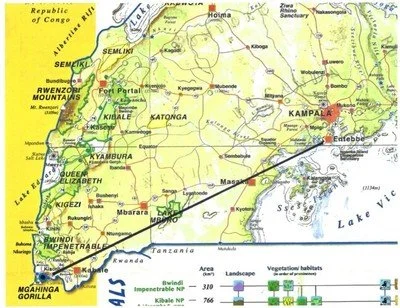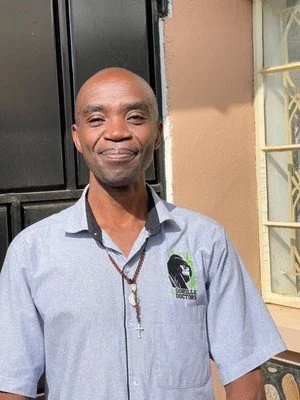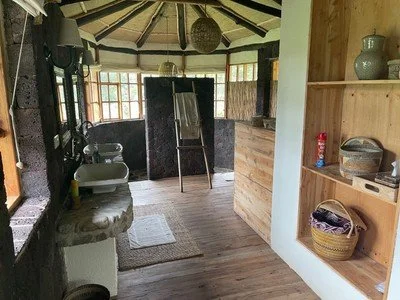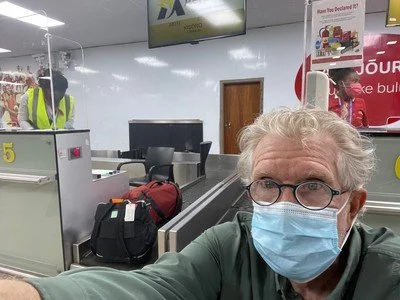Chapter Nine: Let the Games Begin
...escape from Entebbe
12.05.2021 - 12.05.2021 75 °F
View Morocco + Uganda + Rwanda on paulej4's travel map.
The iPhone alarm assaults me at 5:30 so that I am in the lobby for coffee by 5:45; so too is Jonathan who is my driver to EBB airport, only ten minutes away. I quickly settle my bill at No. 5 and we are off to the airport.
At the vehicle security station through which one must pass to enter the airport grounds, one of the guards, all smiles and with strong eye contact, asks, “You would like to buy me a coffee?” holding out his hand to make it clear what he desired. This does not happen to me often around the world but, when it does, I smile and pretend to not understand. Jonathan is silent. The guard turns his smile off and repeats himself, “You would like to buy me a coffee,” but this time without the question mark, it is a statement.
Many years ago, someone wise taught me a lesson: Whoever talks next loses. I fix my gaze upon the guard and say nothing. He does the same to me in return. After 15 seconds or so, his big smile returns and he waves us through.
I ask Jonathan if that happens often but he would prefer not to delve deeply into what just happened and, while he was not the cause of the encounter nor was he the solution. I set it aside.
A couple of minutes farther we find a place to park the van and he assists me from there for the 100-yard walk to the terminal building. I make my way to the AeroLink counter to check in for my flight and, after tipping Jonathan for his help, he wishes me well and departs. The counter clerk asks for my air ticket and I present it. I am asked to place my two backpacks on the scale, which I do, and they are slightly overweight. “There is a charge for that,” she says.
I say, as was my plan, “I will remove my camera and put it around my neck,” and the scale reverts to just one tenth of an ounce overweight. She decides to ignore the extra charge.
“You are not on my passenger list,” she says.
“You can see, I have a ticket,” I reply.
“You are not on my list.” After a few moments she finds a chair, positions it in front of the counter and tells me to sit. “I will have to check with upper management,” she says as she walks away.
I whip out my phone and immediately place a call to mobile number for The Far Horizons manager, Grace. The call does not go through. I call the two Far Horizons office numbers. The calls do not go through. I call the Far Horizons owner, Patrick Shah who I know isn’t even in country but, at this point, and that call does not go through. I require assistance.
I change tactics and switch to WhatsApp and call Grace again and again and again. Finally someone answers. But the call is dropped. This confusion carousel continues to whirl along with the clock until Grace and I finally connect and she says, “But you have a ticket. Give them the ticket.” Of course, I had done that. “I’ll call you back,” says Grace.
The flight leaves in fifteen minutes. Grace calls. “It is fine.” I tell her about the security guard situation. She is aghast.
Dennis appears, “I am AeroLink management,” he said. He has discovered the problem. I have not checked in, as the ticket clearly requires, 30 minutes prior to departure. Rather, I have checked in one year and 30 minutes prior to departure. The ticket I hold is for this date one year from now, in 2022. “I will get it sorted,” said Dennis. And he does.
I make my way to security. There I must remove my laptop from my bag and remove my shoes. As I place all of that on the conveyor belt, I hear, “Mr. Russell. May I have a word please.” Startled, I turn to see it is Dennis. I grab my belongings before they can enter the x-ray chamber and walk to a spot where I can set them down. “Did someone at my counter ask you for anything?” I assume that Grace has spoken with Dennis.
“No. Nobody from AeroLink asked me for anything. It was the security guards at the edge of the airport.” Satisfied, he left. I put my belongings back on the belt, walked through the magnetometer myself (I did not beep) and grabbed my “stuff.” Shoes on, laptop back in backpack, I made it to the boarding gate with not even enough time to sit. My heart was pounding and, it was at this moment, so good that back on November 19 I visited Dr. Craig Lundgren, my heart doctor, for a stress echocardiogram. I passed with flying colors. Knowing that makes me fear the pounding I am feeling in my chest.
Now, after another form of stress echo, I am on my way. Entebbe is at 3,782 feet above sea level. Kisoro is 6,200 feet above sea level, higher than mile-high Denver. It was this thin air flight that mandated two things about this trip: My luggage had to be soft-sided; no rollaboards allowed AND it could not weigh over 15 kilograms. That's 33 pounds. The first restriction dictated two backpacks--which, when toting both, strengthened my aching back and the second kept it from breaking. Kenyan owned Airlink, "The Friendly Airline," flies four 9-passenger, high-wing Cessna 208 Caravan aircraft. Years ago, flying from Topeka to Kansas City, we flew Cessna 207 Skywagens. This is the updated version of that aircraft. Most of these were built in Kansas starting back in the early eighties with some later assembled in China. This one? Not sure.
I think this is the same type aircraft I jumped out of in New Zealand back on September 5, 2008. Pilots often say it is crazy to jump out of a perfectly good aircraft, in fact, one said that to me before my Royal Air Maroc flight to Casablanca a week ago.
We fly straight and level at 8,600 feet to Kisoro Airstrip. Three of the nine passenger seats are filled. The mistake on the air ticket (and it does not matter one bit who made it or who is to blame because rather than fixing blame we all together fixed the problem) is of no consequence now.
Disembarking from the aircraft, the handle and one strap on the backpack that holds my Nikon camera and other heavy items gives out. The backpack falls a short way to the ground but I grab the handrail and stay upright. My phone tumbles however. It does not break. The backpack strap and handle represent a problem for the next two weeks. But, Abdul, my guide and driver for the next week suddenly appears and helps me collect my belongings and see to my well-being. I can immediately tell that I am going to like Abdul. As a bonus, he volunteers to take my severely broken backpack to someone who might be able to sew it up.
On the way out of the airport, I spy three tourists heading for the AeroLink aircraft that I just departed. Each one of them is PULLING A ROLLING BAG!.
“
Let’s get you into the vehicle and into town where we can have some coffee and breakfast. Sound good?” Abdul says. “No, Abdul. That sounds great.” At The Coffee Pot Café Abdul and I bond. He not only treats me to coffee and toast—all I wanted to eat—but he began to tell me about his beloved Uganda and its history.
Soon we are off but only for five minutes when we arrive at Gorilla Doctors where I am warmly greeted by Dr. Fred Nizeyimana. I asked him to remove his mask briefly for this photo. The work he does—along with all the others on his team of course—is spectacular. As Dr. Lundgren takes care of me, Dr. Fred takes care of gorillas. It is my intent to call a meeting of the Board of Directors of The Russell Family Donor Advised Fund and pitch them on a contribution to one of the many supporters of Gorilla Doctors if not to them directly. Dr. Fred does important work. Surely there are more doctors serving people in need in Uganda but Dr. Fred is helping to save a species which was doomed not that long ago. He follows in the steps of Fossey and Goodall and others and he clearly does it well.
After a couple of hours, Abdul and I take our leave and experience what Abdul calls an African Massage, a drive over rutted roads making our way to Mt Gahinga Lodge. We talk of many things, family, culture, ourselves. When I tell him I am 73 years old, he looks at me and says one word, “Papa.” “Papa” is a term of affection offered to those older than you. Abdul is 53.
I learn upon arrival and a warm welcome from Manager Phiona and my “butler” Barbra that, sadly, I am their sole guest. Coronavirus has done to me here in Gahinga the same as it did in the Sahara and in Sri Lanka—I am an orphan tourist. I mention to Abdul that I am saddened for them more than me as people like me are their only source of income and there seem to be no other people like me. But that means that I am doomed to eating alone which is tiresome.
As a part of routine or charity (I do not know which), Abdul graciously sits across from me for lunch (I have spaghetti and meatballs and he has the fish) and briefs me about tomorrow. We also have to decide what I should do this afternoon. My choices are a visit to the Batwa people or climbing the Kisozi Caldera. I opt for the hike—I am in serious need of exercise.
After lunch, Ronald arrives. Ronald is to be my hike leader/guide. Off we go. My Apple Watch tells me that we climbed 850 feet during our 4.2-mile hike which was interrupted by thunder and lightning but only moderately heavy rain. The exercise is wonderful even though the steep and rough terrain is challenging and the thin air noticeable in my lungs.
I am the only white person within what appears to be many miles. The young children see me and smile and wave and yell “Hello.” The slightly older children yell, “Give me some money.” The adults mostly don’t smile nor do they say anything. The older adults refer to me as “granny” which I am told is a term for grandparents regardless of gender. I smile at everyone but most of my smiles go unreturned. I’m not certain that I understand that but it probably has something to do with my situation in life versus their own, a condition which I cannot begin to remedy.
Unpacking, I find that the tumbling backpack is responsible for breaking the protective lens filter on my Nikon. The camera itself is fine. Overnight this night, I am in the foothills of the Virunga Volcano district at Mt Gahinga Lodge which consists of nine thatched bandas with luxurious oversized bush showers for bathing, storm lanterns for light, candles and fireplaces and self-composting toilets for... The lodge is at almost 7,500 feet above sea level, for reference, 500 feet lower than Aspen, Colorado. The higher you go, you find the air to be cooler (or colder) and less dense containing fewer and fewer molecules of oxygen. So what? Is means you must take more breaths to get the same amount of oxygen into your lungs; breathing become more and more difficult the higher you go. If you are acclimated--maybe by living here--your body compensates. If you're just visiting it is a different story. You've got to acclimate and quickly. Some can do that and others can't. Today, the hike was to facilitate that.
The air at higher altitudes is colder, less dense, and contains fewer oxygen molecules. This means that you need to take more breaths in order to get the same amount of oxygen as you would at lower altitudes. The higher the elevation, the more difficult breathing becomes. I had a heck of a time acclimating when in 2016 I went to Machu Picchu stopping at Cusco where the altitude is 11,152. This should be a cakewalk. It’s not that but I manage well.
Back at the lodge, Phiona takes my dinner order (chicken) and Barbra leads me back to my luxurious banda. It is palatial. She offers to clean my shoes from the muddy walk. I say I will not have much to wear to dinner and she says she will bring me klogs. I need a shower. She instructs to turn on the hot water and let it run for a bit. I do. The shower is fabulous, the after-shower robe is colorful and the bottle of 2017 South African Perdeberg Cellar Pinotage with the zebra on the label hits the spot as I sit in front of a fire in the living room hearth. I light the candles on the mantle and write this report of Sunday, December 5, 2021, (not 2022) to let you know that the adventure continues.
Tomorrow: gorillas.
















